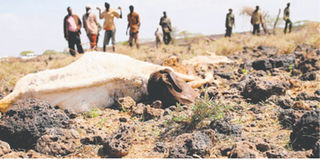Donors cut aid over fresh funds scandal

FILE | NATION
Residents of Buro in Marsabit District count the carcasses of goats during a tour by a team of Ministry of Special Programmes and Kenya Red cross during to assess the effect of drought in February. The World Bank has frozen aid meant for drought stricken areas.
A scandal similar to one that led to donor freeze of Free Primary Education funding has emerged in the programme to save communities from the effects of drought.
Billions of shillings committed by various donors and international lending institutions for fighting drought in Northern Kenya are frozen as the country begins to confront suspension by the World Bank of a critical drought management project that has been running since 1996, and which is currently under the ministry for the Development of Northern Kenya and Other Arid Lands. It is financed by the government and a World Bank loan.
According to a Treasury paper, 70 per cent of Kenya is described as arid and semi-arid.
The World Bank, a key lender and co-ordinator of donor initiative on drought and food security, suspended the critical project last August over corruption concerns and following a forensic audit conducted by its Integrity Vice-Presidency department.
It is projected that by month-end, all arid districts will be in a situation of drought emergency.
Concern is growing as the World Bank move affects release of funds committed by other donors and lenders.
The money in jeopardy includes a Sh600 million European Community grant committed for a drought resistance contingency fund and another Sh1.3 billion that has been ready for disbursement since the beginning of the year.
The forensic audit exposed massive corruption and fraudulent transactions across seven districts of Northern Kenya.
From transactions picked at random from the seven districts, the audit established fraudulent transactions amounting to Sh362 million in two financial years.
The forensic audit catalogues cases where money was spent on dispensaries that were not in use, butcheries that were not certified by Health ministry and schools that did not exist.
Deceit was also identified in livestock restocking programmes, income generating projects and training and consultancy claims.
The auditors said they could not determine whether fixed assets, principally vehicles and computers, were properly used for projects and whether proceeds from items sold were returned to the specific projects.
The report said auditors found cases where lax accounting processes had created huge avenues for embezzling of cash from district bank accounts, mainly through imprest accounts, but also via encashing cheques payable ostensibly to suppliers and the Commissioner of VAT.
“One district simply cashed cheques not recorded in the cash book, another district used an ATM facility and drew funds equating to cheques written in the name of the Commissioner of VAT, which were subsequently not presented,” said the forensic auditors in their report.
They described the expenditures unearthed by the forensic audit as “systemic and serious”, pointing out that, cases of fraud represented approximately 29 per cent of those sampled.
Initially, Finance ministry, a key player in the project’s implementation, came out strongly to rebut the forensic audit findings, describing the report as “sensational” and saying it had the potential of “tarnishing the perception of the country among its peers and benefactors”.
But due to pressure by donor, Treasury presented a governance action plan to address the issues the audit raised.
Top on the list of promises made to donors include a commitment to initiate a new forensic audit of additional districts to be conducted by the Treasury-based Directorate of Internal Audit.
The government has also pledged to present its own audit report to KACC and CID to initiate prosecutions.
The first phase of the project expired in 2003 after spending $24 million (Sh2,1 billion). In the second phase that ended last December, $118 million (Sh10.6 billion) was spent on the project.
The suspension by the World Bank came at a time the government had managed to bring in additional donors for the next phase. These include Danida, DfID and the European Union. The programme’s fate now hangs in the balance.




